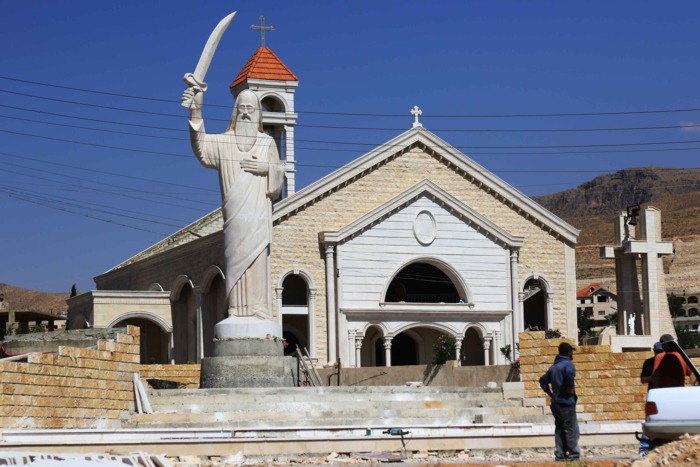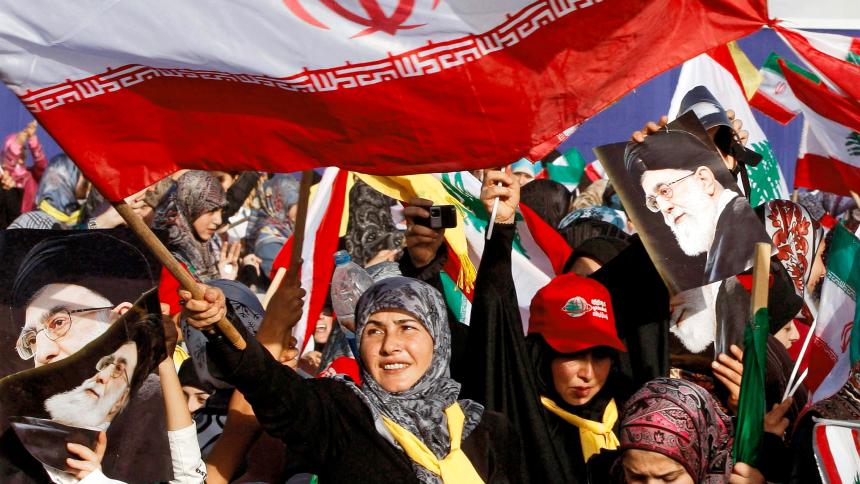I have seen some leftists arguing that Iran is a reactionary, repressive theocracy, and therefore its government deserves no support as it resists US imperialism, critical or otherwise, although its people do. Conversely, I have seen some leftists arguing that because Iran is resisting US imperialism, any left-wing criticisms of the system that it is governed under are either illegitimate or irrelevant. In this article, I will make the argument that the truth lies somewhere in the middle.
The political system in Iran is extremely complex. There are regular elections, which wasn’t the case under the Shah, although they are tightly controlled. Sometimes, there is outright fraud; for example, in 2009 when Ahmadinejad was ‘reelected’, leading to the Green Movement protests. However, during the 2013 presidential race, which led to the election of the moderate Rouhani, the citizenry in Iran was genuinely engaged, energised and enthusiastic. There is widespread repression; political arrests, torture, executions and so on. However, by regional standards, Iran is by no means the worst offender in that regard; Saudi Arabia, the UAE, Bahrain and Egypt – Western favourites – are much worse. For example, Sisi’s regime in Egypt is currently systematically eradicating all traces of civil society; Amnesty International has described the country as “an open-air prison for critics”. Nothing comparable to that is going on in Iran. Moreover, there is a degree of openness in Iranian society, which allows for popular movements to develop that can sometimes constrain the repressive tendencies of the regime; for example, recently a growing anti-death penalty movement has emerged, which succeeded in causing the number of executions to drop by half last year. Iran has a long tradition of popular struggle against repression; for example, a few weeks after the Islamic Revolution, over a hundred thousand women took to the streets to protest against the new laws that made it compulsory to wear the hijab.
There are restrictions on women’s rights in Iran, stemming from the theocratic nature of the regime, although nothing comparable to the situation in Saudi Arabia. For example, women have important positions within the Iranian government, and Iran has the highest female-to-male ratio of university students in the world (60% of university students are women, including more than 70% of students in engineering and pure sciences). Moreover, there is a female-only public park in Tehran where women are legally permitted to remove their hijabs; nothing like that exists in Saudi Arabia. There is a high degree of religious freedom in Iran; for example, both Christians and non-Christians are free to publicly celebrate Christmas, and Iran is home to the largest Jewish population of any Muslim-majority country, who do not face state-sanctioned discrimination or persecution. There is even a Jewish lawmaker in the Iranian parliament. Iran’s record on LGBTQ rights is dire, although the West’s record is hardly stellar either; it was only in 2003 that Section 28 was finally repealed in the UK, which prohibited the “promotion” of homosexuality by local authorities and in schools. Just as was true in the UK, progress on that front can only be achieved in Iran through popular activism.
Since the Islamic Revolution, there has been both progress and regression, which is the case following all revolutions. The most striking aspect of Iran now is that it is truly independent; it is no longer simply a plaything of the US and Britain. It is standing up on its own two feet and is pursuing regional policies that directly conflict with those of the West; in Syria, Palestine, Lebanon, Yemen, Iraq and elsewhere. Iran has a popular culture of resistance to oppressive external forces; this has been strengthened by every hardship imposed on the country since the revolution, including the Iran-Iraq war, which claimed the lives of hundreds of thousands of Iranians, decades of brutal sanctions that have strangled Iran’s economy, and, most recently, Trump’s increasingly unhinged threats of war. Many Iranians continue to support the revolution and the system that it gave birth to, which does not mean that they are uncritical of the regime or that they do not want certain reforms to be implemented. Iranians are a people who are struggling to maintain their independence and their dignity in the face of both global imperialism and domestic repression (which are closely related; the more aggressive the US is towards Iran, the worse the domestic repression becomes).
Iran deserves our critical support and solidarity as it defends itself from US aggression.
Iran’s regional policies are grounded in an anti-imperialist ethos. A clear illustration of this is the instrumental role that Iran played in liberating southern Lebanon from Israel’s brutal and vicious occupation of that territory, through training, arming and funding Hezbollah. Israel’s withdrawal from southern Lebanon in 2000 was a euphoric moment for the entire Arab and Muslim world, and it wouldn’t have been possible without Iran, just as the Viet Cong’s heroic resistance to US aggression wouldn’t have been possible without the Soviet Union. Iran’s continued support for Hezbollah after the Israeli withdrawal enabled it to defeat Israel yet again in 2006, when Israel launched its fifth-ever invasion of the country; Hezbollah’s resistance once again inspired enormous pride across the Arab and Muslim world, uniting Sunnis and Shias. Following that Israeli defeat, a huge amount of civilian infrastructure in southern Lebanon was left in ruins. All of it was rebuilt by Iran. The homes that were destroyed were not just replaced, but were actually improved, which is one of the reasons that Shiites in southern Lebanon feel very loyal to Iran. Furthermore, Iran has continued to supply Hezbollah with a huge amount of funding, which has enabled it to maintain its extensive network of social services that it provides for the poor in southern Lebanon, and with advanced weaponry, which has so far deterred Israel from launching a sixth invasion of the country. It is not an exaggeration to say that through supporting Hezbollah, Iran is defending Lebanon’s existence.
Iran has also been the only consistent source of support for the Palestinian resistance. It supplies weapons and funding to Hamas and Islamic Jihad – Sunni organisations, which puts paid to the idea that Iran is motivated in its regional policies by hostility to Sunnis. Although these organisations have been far from effective in fighting against the Israeli occupation, the Palestinians have a legal right to armed resistance; Iran is the only country that is enabling them to exercise that right. Furthermore, poll data shows that every time Gaza is attacked, the people overwhelmingly rally behind the resistance; there would be nothing to rally behind – no form of defence against the IDF – if it were not for Iran. Moreover, Iran’s funding for Hamas has enabled the organisation to provide humanitarian assistance to families in Gaza struggling due to the Israeli blockade; in 2007, Hamas used Iranian money to provide monthly stipends of $100 for 100,000 workers, and a similar sum for 3,000 fishermen left unemployed because of Israel’s restrictions on fishing, as well as a total of $45 million for prisoners and their families. Iran has also been compensating the families of Palestinians killed or injured during the Great March of Return with a monthly stipend, thus both alleviating their suffering to some extent and enabling this nonviolent form of resistance to continue. Furthermore, Iran provides extensive diplomatic support to Palestine; it is standing firmly against Trump’s so-called ‘Deal of the Century’, while most of the Arab regimes are now openly betraying the Palestinians.


What is notable about Iran’s support for all of these groups is that it is not based on the kind of capitalist self-interest that underpins the US’s attitude towards its allies. Iran doesn’t demand anything from its allies in return for supporting them. It doesn’t sell weapons to these groups; it gives them weapons, funding, training and anything else that they ask for completely free of charge, and in response, these groups naturally become extremely loyal to Iran. This isn’t imperialism, because it isn’t based on coercion, force or even bribery; it’s simply building friendships and alliances through generosity and kindness. That is why so many of these groups, which are situated throughout the region, have publicly stated that they would be willing to sacrifice themselves in order to defend Iran from a US attack. It is also why when many areas of Iran were recently hit by flooding, and the Iranian government was struggling to provide aid to the victims due to US sanctions, a lot of these groups travelled to Iran so that they could assist with the humanitarian relief efforts.
Iran deserves our critical support and solidarity as it defends itself from US aggression. Firstly, because it played an instrumental role in liberating southern Lebanon from Israel’s brutal and vicious occupation of that territory, and has continued to defend Lebanon from Israeli aggression and from ISIS by supporting Hezbollah. Secondly, because it has provided the oppressed Palestinians with continuous support from the very beginning, despite endangering itself in the process. Thirdly, because it has crushed ISIS in Iraq and Syria, thus saving Sunnis, Shias, Christians, Yazidis and others from one of the worst forms of tyranny that the modern world has seen. And lastly, because the Iranian people now appear to overwhelmingly stand behind their government as the US targets it for destruction; not because they all love every aspect of the political and economic system in Iran, but because they are under attack from an aggressive superpower that wants to terrorise them into submission, and they refuse to lay down and surrender.
Just as one could disagree with Stalin’s regime on many issues while simultaneously supporting it as it defended the Russian people from Nazi aggression, so too can one disagree with the Iranian regime on many issues while simultaneously supporting it as it defends the Iranian people from US aggression. There are many internal conflicts within Iranian society between progressive and reactionary forces, but when it comes to standing up to US aggression and imperialism, Iran is one nation, united in defiance. So to support Iran against the US is to necessarily support the government as well as the people – not on all issues, but on this particular issue. This can be done while simultaneously supporting Iranian leftists in their struggle to make Iran a freer and more democratic society. As the fate of the entire region now hangs in the balance, it is incumbent upon all of us to ensure that Iran’s enemies fail in their efforts to destroy this complex, fascinating and deeply misunderstood country.








